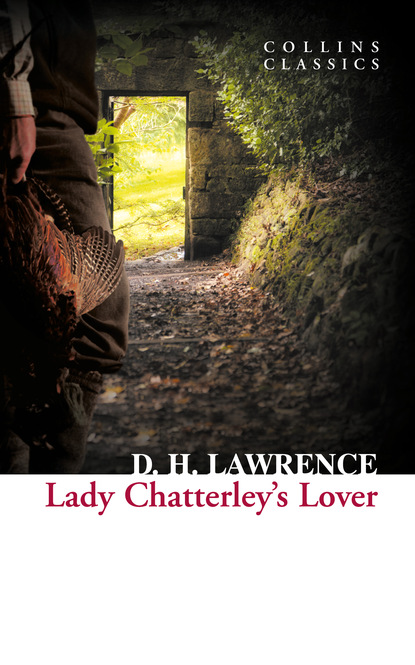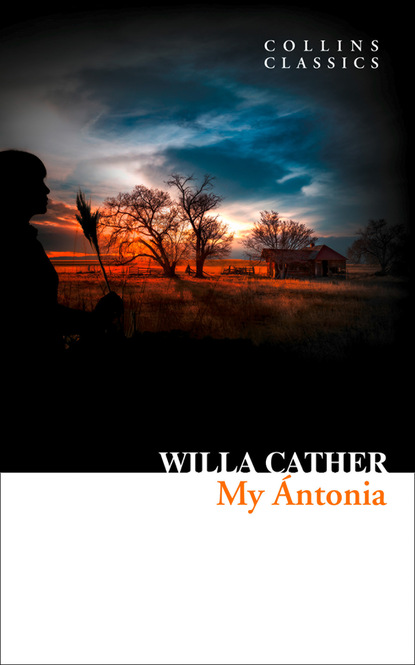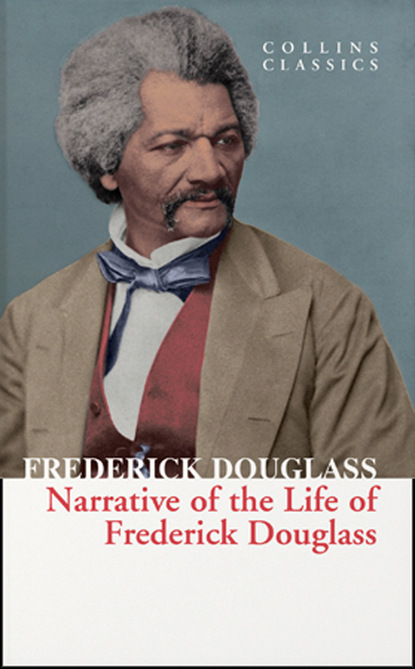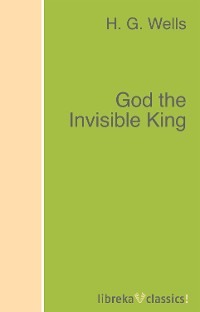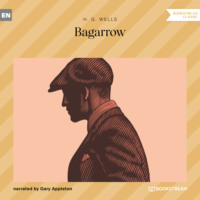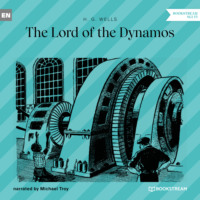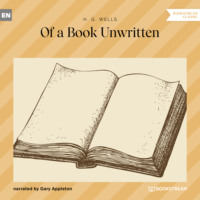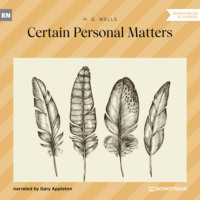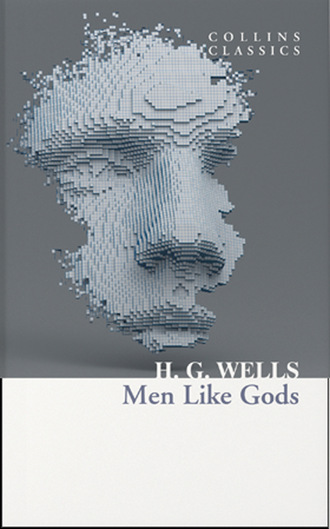
Men Like Gods
Then Mr. Barnstaple heard the voice of the priestly gentleman speaking very softly behind him. “What a perfect form!” he said.
“I admit I was wrong,” said Mr. Burleigh with deliberation. “I have been wrong … These are no earthly people. Manifestly. And ergo, we are not on earth. I cannot imagine what has happened nor where we are. In the face of sufficient evidence I have never hesitated to retract an opinion. This world we are in is not our world. It is something—”
He paused. “It is something very wonderful indeed.”
“And the Windsor party,” said Mr. Catskill without any apparent regret, “must have its lunch without us.”
“But then,” said the clerical gentleman, “what world are we in, and how did we get here?”
“Ah! there,” said Mr. Burleigh blandly, “you go altogether beyond my poor powers of guessing. We are here in some world that is singularly like our world and singularly unlike it. It must be in some way related to our world or we could not be here. But how it can be related, is, I confess, a hopeless mystery to me. Maybe we are in some other dimension of space than those we wot of. But my poor head whirls at the thought of these dimensions. I am—. I am mazed-mazed.”
“Einstein,” injected the gentleman with the eye-glass compactly and with evident self-satisfaction.
“Exactly!” said Mr. Burleigh. “Einstein might make it clear to us. Or dear old Haldane might undertake to explain it and fog us up with that adipose Hegelianism of his. But I am neither Haldane nor Einstein. Here we are in some world which is, for all practical purposes, including the purposes of our week-end engagements, Nowhere. Or if you prefer the Greek of it, we are in Utopia. And as I do not see that there is any manifest way out of it again, I suppose the thing we have to do as rational creatures is to make the best of it. And watch our opportunities. It is certainly a very lovely world. The loveliness is even greater than the wonder. And there are human beings here—with minds. I judge from all this material lying about, it is a world in which experimental chemistry is pursued—pursued indeed to the bitter end—under almost idyllic conditions. Chemistry—and nakedness. I feel bound to confess that whether we are to regard these two people who have apparently just blown themselves up here as Greek gods or as naked savages, seems to me to be altogether a question of individual taste. I admit a bias for the Greek god—and goddess.”
“Except that it is a little difficult to think of two dead immortals,” squeaked the gentleman of the eye-glass in the tone of one who scores a point.
Mr. Burleigh was about to reply, and to judge from his ruffled expression his reply would have been of a disciplinary nature. But instead he exclaimed sharply and turned round to face two newcomers. The whole party had become aware of them at the same moment. Two stark Apollos stood over the ruin and were regarding our Earthlings with an astonishment at least as great as that they created.
One spoke, and Mr. Barnstaple was astonished beyond measure to find understandable words reverberating in his mind.
“Red Gods!” cried the Utopian. “What things are you? And how did you get into the world?”
(English! It would have been far less astounding if they had spoken Greek. But that they should speak any known language was a matter for incredulous amazement.)
2
Mr. Cecil Burleigh was the least disconcerted of the party. “Now,” he said, “we may hope to learn something definite—face to face with rational and articulate creatures.”
He cleared his throat, grasped the lapels of his long dust-coat with two long nervous hands and assumed the duties of spokesman. “We are quite unable, gentlemen, to account for our presence here,” he said. “We are as puzzled as you are. We have discovered ourselves suddenly in your world instead of our own.”
“You come from another world?”
“Exactly. A quite different world. In which we have all our natural and proper places. We were travelling in that world of ours in—Ah!—certain vehicles, when suddenly we discovered ourselves here. Intruders, I admit, but, I can assure you, innocent and unpremeditated intruders.”
“You do not know how it is that Arden and Greenlake have failed in their experiment and how it is that they are dead?”
“If Arden and Greenlake are the names of these two beautiful young people here, we know nothing about them except that we found them lying as you see them when we came from the road hither to find out or, in fact, to inquire—”
He cleared his throat and left his sentence with a floating end.
The Utopian, if we may for convenience call him that, who had first spoken, looked now at his companion and seemed to question him mutely. Then he turned to the Earthlings again. He spoke and again those clear tones rang, not—so it seemed to Mr. Barnstaple—in his ears but within his head.
“It will be well if you and your friends do not trample this wreckage. It will be well if you all return to the road. Come with me. My brother here will put an end to this burning and do what needs to be done to our brother and sister. And afterwards this place will be examined by those who understand the work that was going on here.”
“We must throw ourselves entirely upon your hospitality,” said Mr. Burleigh. “We are entirely at your disposal. This encounter, let me repeat, was not of our seeking.”
“Though we should certainly have sought it if we had known of its possibility,” said Mr. Catskill, addressing the world at large and glancing at Mr. Barnstaple as if for confirmation. “We find this world of yours—most attractive.”
“At the first encounter,” the gentleman with the eye-glass endorsed, “a most attractive world.”
As they returned through the thick-growing flowers to the road, in the wake of the Utopian and Mr. Burleigh, Mr. Barnstaple found Lady Stella rustling up beside him. Her words, in this setting of pure wonder, filled him with amazement at their serene and invincible ordinariness. “Haven’t we met before somewhere—at lunch or something—Mr.—Mr.—?”
Was all this no more than a show? He stared at her blankly for a moment before supplying her with:
“Barnstaple.”
“Mr. Barnstaple?”
His mind came into line with hers.
“I’ve never had that pleasure, Lady Stella. Though, of course, I know you—I know you very well from your photographs in the weekly illustrated papers.”
“Did you hear what it was that Mr. Cecil was saying just now? About this being Utopia?”
“He said we might call it Utopia.”
“So like Mr. Cecil. But is it Utopia?—really Utopia?
“I’ve always longed so to be in Utopia,” the lady went on without waiting for Mr. Barnstaple’s reply to her question. “What splendid young men these two Utopians appear to be! They must, I am sure, belong to its aristocracy—in spite of their—informal—costume. Or even because of it.” …
Mr. Barnstaple had a happy thought. “I have also recognized Mr. Burleigh and Mr. Rupert Catskill, Lady Stella, but I should be so glad if you would tell me who the young gentleman with the eye-glass is, and the clerical gentleman. They are close behind us.”
Lady Stella imparted her information in a charmingly confidential undertone. “The eye-glass,” she murmured, “is—I am going to spell it—F.R.E.D.D.Y. M.U.S.H. Taste. Good taste. He is awfully clever at finding out young poets and all that sort of literary thing. And he’s Rupert’s secretary. If there is a literary Academy, they say, he’s certain to be in it. He’s dreadfully critical and sarcastic. We were going to Taplow for a perfectly intellectual week-end, quite like the old times. So soon as the Windsor people had gone again, that is … Mr. Gosse was coming and Max Beerbohm—and everyone like that. But nowadays something always happens. Always … The unexpected—almost excessively … The clerical collar”—she glanced back to judge whether she was within earshot of the gentleman under discussion—“is Father Amerton, who is so dreadfully outspoken about the sins of society and all that sort of thing. It’s odd, but out of the pulpit he’s inclined to be shy and quiet and a little awkward with the forks and spoons. Paradoxical, isn’t it?”
“Of course!” cried Mr. Barnstaple. “I remember him now. I knew his face but I couldn’t place it. Thank you so much, Lady Stella.”
3
There was something very reassuring to Mr. Barnstaple in the company of these famous and conspicuous people and particularly in the company of Lady Stella. She was indeed heartening: she brought so much of the dear old world with her, and she was so manifestly prepared to subjugate this new world to its standards at the earliest possible opportunity. She fended off much of the wonder and beauty that had threatened to submerge Mr. Barnstaple altogether. Meeting her and her company was in itself for a man in his position a minor but considerable adventure that helped to bridge the gulf of astonishment between the humdrum of his normal experiences and this all too bracing Utopian air. It solidified, it—if one may use the word in such a connexion—it degraded the luminous splendour about him towards complete credibility that it should also be seen and commented on by her and by Mr. Burleigh, and viewed through the appraising monocle of Mr. Freddy Mush. It brought it within range of the things that get into the newspapers. Mr. Barnstaple alone in Utopia might have been so completely overawed as to have been mentally overthrown. This easy-mannered brown-skinned divinity who was now exchanging questions with Mr. Burleigh was made mentally accessible by that great man’s intervention.
Yet it was with something very like a catching of the breath that Mr. Barnstaple’s attention reverted from the Limousine people to this noble-seeming world into which he and they had fallen. What sort of beings really were these men and women of a world where ill-bred weeds, it seemed, had ceased to thrust and fight amidst the flowers, and where leopards void of feline malice looked out with friendly eyes upon the passer-by?
It was astounding that the first two inhabitants they had found in this world of subjugated nature should be lying dead, victims, it would seem, of some hazardous experiment. It was still more astonishing that this other pair who called themselves the brothers of the dead man and woman should betray so little grief or dismay at the tragedy. There had been no emotional scene at all, Mr. Barnstaple realized, no consternation or weeping. They were evidently much more puzzled and interested than either horrified or distressed.
The Utopian who had remained in the ruin, had carried out the body of the girl to lay it beside her companion’s, and he had now, Mr. Barnstaple saw, returned to a close scrutiny of the wreckage of the experiment.
But now more of these people were coming upon the scene. They had Aeroplanes in this world, for two small ones, noiseless and swift in their flight as swallows, had landed in the fields near by. A man had come up along the road on a machine like a small two-wheeled two-seater with its wheels in series, bicycle fashion; lighter and neater it was than any earthly automobile and mysteriously able to stand up on its two wheels while standing still. A burst of laughter from down the road called Mr. Barnstaple’s attention to a group of these Utopians who had apparently found something exquisitely ridiculous in the engine of the Limousine. Most of these people were as scantily clothed and as beautifully built as the two dead experimentalists, but one or two were wearing big hats of straw, and one who seemed to be an older woman of thirty or more wore a robe of white bordered by an intense red line. She was speaking now to Mr. Burleigh.
Although she was a score of yards away, her speech presented itself in Mr. Barnstaple’s mind with great distinctness.
“We do not even know as yet what connexion your coming into our world may have with the explosion that has just happened here or whether, indeed, it has any connexion. We want to inquire into both these things. It will be reasonable, we think, to take you and all the possessions you have brought with you to a convenient place for a conference not very far from here. We are arranging for machines to take you thither. There perhaps you will eat. I do not know when you are accustomed to eat?”
“Refreshment,” said Mr. Burleigh, rather catching at the idea. “Some refreshment would certainly be acceptable before very long. In fact, had we not fallen so sharply out of our own world into yours, by this time we should have been lunching—lunching in the best of company.”
“Wonder and lunch,” thought Mr. Barnstaple. Man is a creature who must eat by necessity whether he wonder or no. Mr. Barnstaple perceived indeed that he was already hungry and that the air he was breathing was a keen and appetizing air.
The Utopian seemed struck by a novel idea. “Do you eat several times a day? What sort of things do you eat?”
“Oh! Surely! They’re not vegetarians!” cried Mr. Mush sharply in a protesting parenthesis, dropping his eye-glass from its socket.
They were all hungry. It showed upon their faces.
“We are all accustomed to eat several times a day,” said Mr. Burleigh. “Perhaps it would be well if I were to give you a brief resume of our dietary. There may be differences. We begin, as a rule, with a simple cup of tea and the thinnest slice of bread-and-butter brought to the bedside. Then comes breakfast.” … He proceeded to a masterly summary of his gastronomic day, giving clearly and attractively the particulars of an English breakfast, eggs to be boiled four and a half minutes, neither more nor less, lunch with any light wine, tea rather a social rally than a serious meal, dinner, in some detail, the occasional resort to supper. It was one of those clear statements which would have rejoiced the House of Commons, light, even gay, and yet with a trace of earnestness. The Utopian woman regarded him with deepening interest as he proceeded. “Do you all eat in this fashion?” she asked.
Mr. Burleigh ran his eye over his party. “I cannot answer for Mr.—Mr.—?”
“Barnstaple … Yes, I eat in much the same fashion.”
For some reason the Utopian woman smiled at him. She had very pretty brown eyes, and though he liked her to smile he wished that she had not smiled in the way she did.
“And you sleep?” she asked.
“From six to ten hours, according to circumstances,” said Mr. Burleigh.
“And you make love?”
The question perplexed and to a certain extent shocked our Earthlings. What exactly did she mean? For some moments no one framed a reply. Mr. Barnstaple’s mind was filled with a hurrying rush of strange possibilities.
Then Mr. Burleigh, with his fine intelligence and the quick evasiveness of a modern leader of men, stepped into the breach. “Not habitually, I can assure you,” he said. “Not habitually.”
The woman with the red-bordered robe seemed to think this over for a swift moment. Then she smiled faintly.
“We must take you somewhere where we can talk of all these things,” she said. “Manifestly you come from some strange other world. Our men of knowledge must get together with you and exchange ideas.”
4
At half-past ten that morning Mr. Barnstaple had been motoring along the main road through Slough, and now at half-past one he was soaring through wonderland with his own world half forgotten. “Marvellous,” he repeated. “Marvellous. I knew that I should have a good holiday. But this, this—!”
He was extraordinarily happy with the bright unclouded happiness of a perfect dream. Never before had he enjoyed the delights of an explorer in new lands, never before had he hoped to experience these delights. Only a few weeks before he had written an article for the Liberal lamenting the “End of the Age of Exploration,” an article so thoroughly and aimlessly depressing that it had pleased Mr. Peeve extremely. He recalled that exploit now with but the faintest twinge of remorse.
The Earthling party had been distributed among four small aeroplanes, and as Mr. Barnstaple and his companion, Father Amerton, rose in the air, he looked back to see the automobiles and luggage being lifted with astonishing ease into two lightly built lorries. Each lorry put out a pair of glittering arms and lifted up its automobile as a nurse might lift up a baby.
By contemporary earthly standards of safety Mr. Barnstaple’s aviator flew very low. There were times when he passed between trees rather than over them, and this, even if at first it was a little alarming, permitted a fairly close inspection of the landscape. For the earlier part of the journey it was garden pasture with grazing creamy cattle and patches of brilliantly coloured vegetation of a nature unknown to Mr. Barnstaple. Amidst this cultivation narrow tracks, which may have been foot or cycle tracks, threaded their way. Here and there ran a road bordered with flowers and shaded by fruit trees.
There were few houses and no towns or villages at all. The houses varied very greatly in size, from little isolated buildings which Mr. Barnstaple thought might be elegant summer-houses or little temples, to clusters of roofs and turrets which reminded him of country chateaux or suggested extensive farming or dairying establishments. Here and there people were working in the fields or going to and fro on foot or on machines, but the effect of the whole was of an extremely underpopulated land.
It became evident that they were going to cross the range of snowy mountains that had so suddenly blotted the distant view of Windsor Castle from the landscape.
As they approached these mountains, broad stretches of golden corn-land replaced the green of the pastures and then the cultivation became more diversified. He noted unmistakable vineyards on sunny slopes, and the number of workers visible and the habitations multiplied. The little squadron of aeroplanes flew up a broad valley towards a pass so that Mr. Barnstaple was able to scrutinize the mountain scenery. Came chestnut woods and at last pines. There were Cyclopean turbines athwart the mountain torrents and long, low, many-windowed buildings that might serve some industrial purpose. A skilfully graded road with exceedingly bold, light and beautiful viaducts mounted towards the pass. There were more people, he thought, in the highland country than in the levels below, though still far fewer than he would have seen upon any comparable countryside on earth.
Ten minutes of craggy desolation with the snow-fields of a great glacier on one side intervened before he descended into the upland valley on the Conference Place where presently he alighted. This was a sort of lap in the mountain, terraced by masonry so boldly designed that it seemed a part of the geological substance of the mountain itself. It faced towards a wide artificial lake retained by a stupendous dam from the lower reaches of the valley. At intervals along this dam there were great stone pillars dimly suggestive of seated figures. He glimpsed a wide plain beyond, which reminded him of the valley of the Po, and then as he descended the straight line of the dam came up to hide this further vision.
Upon these terraces, and particularly upon the lower ones, were groups and clusters of flowerlike buildings, and he distinguished paths and steps and pools of water as if the whole place were a garden.
The aeroplanes made an easy landing on a turfy expanse. Close at hand was a graceful chalet that ran out from the shores of the lake over the water, and afforded mooring to a flotilla of gaily coloured boats …
It was Father Amerton who had drawn Mr. Barnstaple’s attention to the absence of villages. He now remarked that there was no church in sight and that nowhere had they seen any spires or belfries. But Mr. Barnstaple thought that some of the smaller buildings might be temples or shrines. “Religion may take different forms here,” he said.
“And how few babies or little children are visible!” Father Amerton remarked. “Nowhere have I seen a mother with her child.”
“On the other side of the mountains there was a place like the playing field of a big school. There were children there and one or two older people dressed in white.”
“I saw that. But I was thinking of babes. Compare this with what one would see in Italy.
“The most beautiful and desirable young women,” added the reverend gentleman; “most desirable—and not a sign of maternity!”
Their aviator, a sun-tanned blond with very blue eyes, helped them out of his machine, and they stood watching the descent of the other members of their party. Mr. Barnstaple was astonished to note how rapidly he was becoming familiarized with the colour and harmony of this new world; the strangest things in the whole spectacle now were the figures and clothing of his associates. Mr. Rupert Catskill in his celebrated grey top hat, Mr. Mush with his preposterous eye-glass, the peculiar long slenderness of Mr. Burleigh, and the square leather-clad lines of Mr. Burleigh’s chauffeur, struck him as being far more incredible than the graceful Utopian forms about him.
The aviator’s interest and amusement enhanced Mr. Barnstaple’s perception of his companions’ oddity. And then came a wave of profound doubt.
“I suppose this is really real,” he said to Father Amerton.
“Really real! What else can it be?”
“I suppose we are not dreaming all this.”
“Are your dreams and my dreams likely to coincide?”
“Yes; but there are quite impossible things—absolutely impossible things.”
“As, for instance?”
“Well, how is it that these people are speaking to us in English—modern English?”
“I never thought of that. It is rather incredible. They don’t talk in English to one another.”
Mr. Barnstaple stared in round-eyed amazement at Father Amerton, struck for the first time by a still more incredible fact. “They don’t talk in anything to one another,” he said. “And we haven’t noticed it until this moment!”
IV. THE SHADOW OF EINSTEIN FALLS ACROSS THE STORY BUT PASSES LIGHTLY BY
1
Except for that one perplexing fact that all these Utopians had apparently a complete command of idiomatic English, Mr. Barnstaple found his vision of this new world developing with a congruity that no dream in his experience had ever possessed. It was so coherent, so orderly, that less and less was it like a strange world at all and more and more like an arrival in some foreign but very highly civilized country.
Under the direction of the brown-eyed woman in the scarlet-edged robe, the Earthlings were established in their quarters near the Conference Place in the most hospitable and comfortable fashion conceivable. Five or six youths and girls made it their business to initiate the strangers in the little details of Utopian domesticity. The separate buildings in which they were lodged had each an agreeable little dressing-room, and the bed, which had sheets of the finest linen and a very light puffy coverlet, stood in an open loggia—too open Lady Stella thought, but then as she said, “One feels so safe here.” The luggage appeared and the valises were identified as if they were in some hospitable earthly mansion.
But Lady Stella had to turn two rather too friendly youths out of her apartment before she could open her dressing-bag and administer refreshment to her complexion.
A few minutes later some excitement was caused by an outbreak of wild laughter and the sounds of an amiable but hysterical struggle that came from Lady Stella’s retreat. The girl who had remained with her had displayed a quite feminine interest in her equipment and had come upon a particularly charming and diaphanous sleeping suit. For some obscure reason this secret daintiness amused the young Utopian extremely, and it was with some difficulty that Lady Stella restrained her from putting the garment on and dancing out in it for a public display. “Then you put it on,” the girl insisted.


